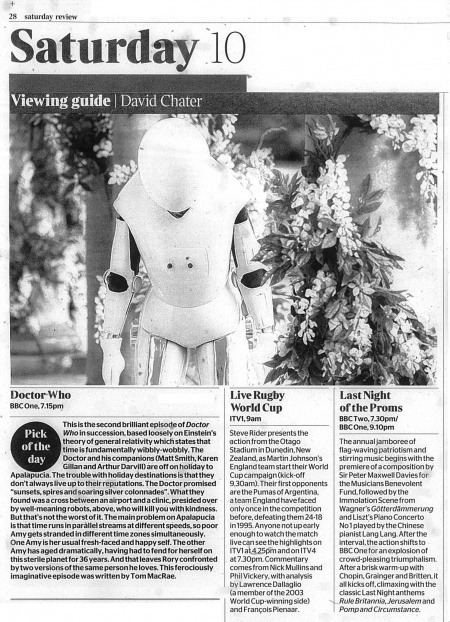Einstein's theory of general relativity which states that time is fundamentally wibbly-wobbly
- Publication: The Times
- Date: 2011-09-10
- Author: David Chater
- Page: Saturday Review, p. 10
- Language: English
- Notes: A reader repsonds
This is the second brilliant episode of Doctor Who in succession, based loosely on Einstein's theory of general relativity which states that time is fundamentally wibbly-wobbly. The Doctor and his companions (Matt Smith, Karen Gillan and Arthur Darvill) are off on holiday to Apalapucia. The trouble with holiday destinations is that they don't always live up to their reputations. The Doctor promised "sunsets, spires and soaring silver colonnades". What they found was a cross between an airport and a clinic, presided over by well-meaning robots, above, who will kill you with kindness. But that's not the worst of it. The main problem on Apalapucia is that time runs in parallel streams at different speeds, so poor Amy gets stranded in different time zones simultaneously. One Amy is her usual fresh-faced and happy self. The other Amy has aged dramatically, having had to fend for herself on this sterile planet for 36 years. And that leaves Rory confronted by two versions of the same person he loves. This ferociously imaginative episode was written by Tom MacRae.
Disclaimer: These citations are created on-the-fly using primitive parsing techniques. You should double-check all citations. Send feedback to whovian@cuttingsarchive.org
- APA 6th ed.: Chater, David (2011-09-10). Einstein's theory of general relativity which states that time is fundamentally wibbly-wobbly. The Times p. Saturday Review, p. 10.
- MLA 7th ed.: Chater, David. "Einstein's theory of general relativity which states that time is fundamentally wibbly-wobbly." The Times [add city] 2011-09-10, Saturday Review, p. 10. Print.
- Chicago 15th ed.: Chater, David. "Einstein's theory of general relativity which states that time is fundamentally wibbly-wobbly." The Times, edition, sec., 2011-09-10
- Turabian: Chater, David. "Einstein's theory of general relativity which states that time is fundamentally wibbly-wobbly." The Times, 2011-09-10, section, Saturday Review, p. 10 edition.
- Wikipedia (this article): <ref>{{cite news| title=Einstein's theory of general relativity which states that time is fundamentally wibbly-wobbly | url=http://cuttingsarchive.org/index.php/Einstein%27s_theory_of_general_relativity_which_states_that_time_is_fundamentally_wibbly-wobbly | work=The Times | pages=Saturday Review, p. 10 | date=2011-09-10 | via=Doctor Who Cuttings Archive | accessdate=26 April 2024 }}</ref>
- Wikipedia (this page): <ref>{{cite web | title=Einstein's theory of general relativity which states that time is fundamentally wibbly-wobbly | url=http://cuttingsarchive.org/index.php/Einstein%27s_theory_of_general_relativity_which_states_that_time_is_fundamentally_wibbly-wobbly | work=Doctor Who Cuttings Archive | accessdate=26 April 2024}}</ref>
